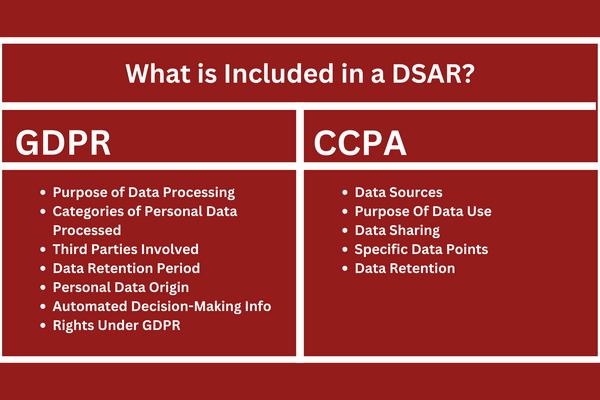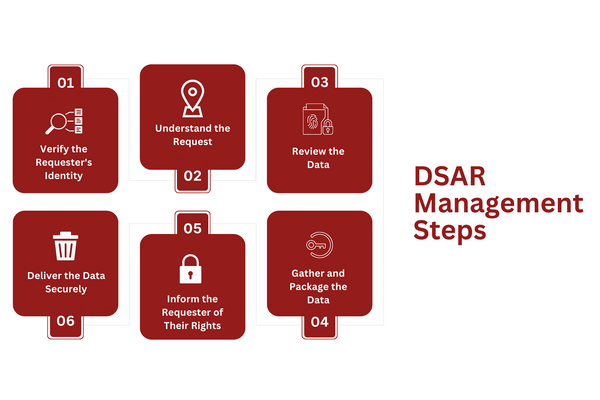
These days, businesses collect a ton of personal info on people. So they must be really careful and handle requests for that data, also known as DSAR, properly.
That’s where DSAR management comes in – it helps businesses deal with those requests in the right way. It shows consumers that businesses care about protecting their information.
In this article, we’ll chat about what exactly DSARs are, why they matter so much, and how businesses can rock it when they get those requests.
Key Takeaways
Data subject access requests are a big deal for businesses these days. Get real transparent with consumers; show them you respect their privacy with good DSAR management.
To manage DSARs properly, verify identities, understand the request, review the information, gather and package the data, inform the requester of their rights, and deliver the data securely.
Captain Compliance is here to be your guide through data privacy compliance.
Why DSAR Management is Essential
DSARs let people see and control their personal info. Businesses need to handle these requests right.
People share a bunch of stuff about themselves online these days. Sometimes, we wonder, what happens to all that info we put out there? Data Subject Access Requests – or DSARs for short – are a way people can ask businesses, what do you know about me?
DSARs started becoming a thing when big privacy rules like GDPR and CCPA popped up. These laws say that businesses need to treat personal information carefully and be transparent with everything.
So why should businesses care about handling DSARs properly? For one thing, it’s just being transparent, and if a consumer asks, “what’s in my file?” a trustworthy business will show them.
DSARs also let people fix or delete their info if they want. But DSARs can be a pain to deal with. Finding one person’s records in a sea of personal data is like searching for a needle in a haystack!
And businesses can’t drag their feet – they must reply quickly and accurately. If they mess up, they could get slammed with massive fines.
How Does a DSAR Request Work?
How Does a DSAR Request Work.jpg

When someone asks a business for their personal information, it’s called a DSAR or SAR request.
Here’s how businesses handle these requests: first, the business needs to spot when someone makes a DSAR. People might email, use a form on the website, or even send a letter asking about their data.
Before handing over any information, the business has to confirm the person is who they say they are. This is like a safety check to make sure private stuff doesn’t get sent to the wrong person accidentally. After verifying their identity, the business starts digging through their systems, files, and other places to find the data being requested.
Finding everything can take some time since it can be spread across many different spots.
DSARs might ask for different things, too. Some people only want to see their data, while others might request changes, deletions, or transfer it somewhere else. Businesses need to be ready for any of these types of tasks. Some DSARs can be tricky to handle properly.
For example, a business might not be allowed to erase certain data because of other rules. In cases like these, businesses need to be extra careful and think about what’s best for everyone involved.
Businesses need to respond to data access requests quickly – usually within 30-45 days (although there are possible extensions depending on the regulation). If they take too long to provide the information requested, they could face penalties.
It’s not enough just to provide the data in response to the request. Businesses should also document what they did to comply. This way, if someone reviews how they handled it later, the business can show they did everything by the book. These data access requests are a big responsibility for businesses.
They’re about being transparent with people about the personal data being kept about them. If businesses handle these requests properly, they can build more trust with their consumers.
What is Included in a DSAR?
What is Included in a DSAR.png

Businesses nowadays have to deal with the tricky world of data privacy rules. Understanding Data Subject Access Requests (DSARs) is super important since major regulations like GDPR and CCPA require them. But what exactly needs to be included in these requests?
For GDPR
The General Data Protection Regulation (GDPR) is a European law that lets people access personal data that businesses have about them. DSARs under GDPR tend to cover:
Purpose of Data Processing: Why are you processing the personal data? Is it necessary for a contract, or is there another legal basis for doing so?
Categories of Personal Data Processed: What types and categories of information do you process about an individual? This may include name, address details, etc.
Personal Data Recipients/Third Parties Involved: Who else has access to this personal data outside your business? Do third-party service providers get hold of that basic user information in any way?
Data Retention Period: How long do you keep the personal data? It’s crucial to state this, whether it’s based on a GDPR provision or determined by your company policy.
Personal Data Origin (if not collected from the individual): If any part of that information was collected via third parties rather than directly provided by the person themselves, they have every right under GDPR to know these details.
Automated Decision-Making Information: Is their data being used for automated profiling and decisions?
Rights Under GDPR: Inform them about all rights vested in them when it comes to the handling of their personal info- The right to correct inaccurate data, delete unnecessary ones, restrict processing, etc.
For CCPA
The California Consumer Privacy Act (CCPA) is a US regulation, similar to GDPR, that gives people rights over their personal information. CCPA DSAR often includes:
Data Sources: Are you obtaining this information directly from the individuals themselves? Do they provide it to us via forms and surveys on our website or app? Or are we collecting their digital footprint through third-party cookies and tracking technologies when they visit our site?
Purpose Of Data Use: Are you using the data collected for specific purposes such as marketing, service improvement, or research? Is it being used to tailor personalized advertising content or improve website usability based on their preferences?
Data Sharing: Do you share this information with third parties like our partners and affiliates? Or maybe it’s sent out to vendors who help manage our customer database operations.
Specific Data Points: If someone asks, you should be ready to provide them with specific details about the individual pieces of information you’ve collected. It can include, but is not limited to, their contact information such as name and email, behavioral data like browsing history or purchase records associated with them, etc.
Data Retention: How long are you retaining the collected data? Is it stored until certain tasks or operations are completed, or is a specific retention period followed based on legal requirements?
Businesses have to keep in mind that DSARs aren’t just about following the rules. They’re really about getting consumers to trust you. See, when someone gives a business their personal info, they expect it’ll be handled right. DSARs let people make sure the biz is doing things on the up and up.
DSARs sound pretty straightforward in theory, but the whole process can get messy real fast. Using DSAR software can help, but data is usually spread out all over the place in different systems, so pulling it together can be a headache.
On top of that, you’ll have deadlines breathing down your neck – GDPR and CCPA say you get back to people within a certain timeframe. So there’s a lot of pressure.
DSAR Management Steps
DSAR Management Steps.png

Handling data subject access requests, or DSARs is an important part of respecting consumer privacy. With these requests, consumers can ask businesses what personal info they have saved about them.
Businesses need to be able to handle DSARs in an organized way. Let’s delve into the steps businesses should take to manage DSARs effectively.
Verify the Requester’s Identity
First, make sure the person asking for the data is who they say they are. You don’t want the wrong person getting personal information.
This is an easy way to end up with a serious data breach. That’s why businesses should take the time to do their due diligence and confirm that this is indeed the person to whom the data belongs.
Understand the Request
After making sure you know who the person is that’s asking for their data, you get a close look over what they’re asking for. Some people might just want everything you have on them, but others might want the business to do specific tasks, like correcting certain data.
Businesses must clear up anything confusing in what the persons are asking for. That way, you can get them the exact info they want.
Review the Data
Before sharing any data, review it carefully. Ensure it doesn’t include someone else’s personal information. It’s also helpful to explain why certain data was collected, providing clarity to the requester.
Additionally, cross-checking the data ensures that it aligns with the business’s records, guaranteeing accuracy in the information provided.
Gather and Package the Data
When the business gets all the info the person asked for, it’s essential to be sure that the information is in a format they can open and read – nothing too crazy technical, and the point is they should be able to access their data without any issues. This is what’s called portability when talking about data privacy stuff.
Inform the Requester of Their Rights
In your response, remind the individual of their data privacy rights. This includes their right to restrict the data processing, their right to delete their data, and their right to request data correction. Also, inform them about their right to lodge a complaint with supervisory authorities.
Deliver the Data Securely
Once all your checks have been made and the data is packaged, you need to ensure that it’s sent over a secure channel. This can either be via encrypted email or through another secure portal.
It is extremely important to document all DSAR-related communications for accountability and compliance purposes.
Challenges of DSAR Management
In today’s interconnected world, businesses are collecting and storing vast amounts of data. This data, while invaluable for operations, brings with it the responsibility of managing Data Subject Access Requests (DSARs).
While DSARs are crucial for transparency and trust, they present a unique set of challenges for businesses. Let’s explore these challenges in detail:
Pinpointing Where All Data is
Navigating the vast data landscape is no small feat. Modern businesses use a myriad of systems, applications, and platforms, each storing bits of customer data. When a DSAR comes in, pinpointing every piece of data related to an individual becomes a hard task.
Imagine a retail business that has both online and offline stores. A customer’s data might be spread across the e-commerce platform, CRM, email marketing tools, loyalty programs, and even in-store purchase records.
Collating this data for a single DSAR can be time-consuming and complex.
Verification Complexities
Ensuring the authenticity of a DSAR is paramount. Businesses must verify the identity of the requester to prevent potential data breaches. However, this verification process is a delicate balance.
A financial institution receives a DSAR. While they need to be certain they’re sharing data with the rightful owner, asking for too much additional verification might deter the consumer and be seen as an obstruction.
Tight Deadlines
Regulations like the GDPR and CCPA impose strict deadlines on DSAR responses. These tight timelines, combined with the intricacies of data retrieval, make DSAR management a high-pressure task.
A tech business with a global consumer base might receive multiple DSARs in a week. Processing these within the short timeframes provided (30 days for GDPR and 45 days for CCPA), especially when personal data is spread across different servers and regions, becomes a race against time.
Risk of Non-Compliance
DSARs are not just about customer service; they’re a legal obligation. Failing to handle them correctly can lead to severe consequences.
A small e-commerce business, unaware of the nuances of the CCPA, might inadvertently delay a DSAR response. This delay can lead to legal actions, fines, and a damaged reputation.
Balancing Transparency and Privacy
DSARs aim to provide individuals with transparency about their personal data. However, businesses must ensure they don’t accidentally disclose someone else’s information.
In a shared document where multiple employees have collaborated, one employee’s DSAR might risk exposing another’s comments or inputs. Businesses must tread carefully to protect everyone’s privacy.
Resource Intensiveness
DSARs are not a one-person job. They require coordination across teams, consuming significant manpower and time, with the average cost of one being $1400.
A hotel chain receives a DSAR from a guest. The IT team retrieves digital records, the front desk checks physical logs, and the legal team reviews the personal data. The coordination and effort involved are substantial.
Continuous Evolution of Regulations
Data protection laws are dynamic. They change, adapt, and evolve, making continuous compliance a moving target.
A multinational business compliant with the GDPR might find itself scrambling when a new regulation, like Brazil’s LGPD, comes into play. Staying updated and adapting becomes a continuous challenge.
The Captain Compliance Advantage
Facing the challenges of DSAR management might seem like a daunting task, but businesses aren’t alone in this journey. By partnering with us at Captain Compliance and utilizing our compliance services, the path through the DSAR maze becomes clearer and more manageable.
Our expertise ensures that businesses can concentrate on what they do best, their core operations, while we handle the intricacies of DSAR management. After all, why wrestle with complexities when you have us, a seasoned team, guiding the way?
Comprehensive GDPR Assistance
Captain Compliance really does more than just handle those DSARs. We take a big-picture approach to GDPR compliance that makes sure you’ve got everything covered, not just the data requests. It’s not only about doing the minimum on DSARs – we want to help build a smooth, easy experience for your consumers, too.
Whether it’s coming up with plans or putting controls in place, Captain Compliance is there for the whole ride. And as the laws change, we have got your back to adapt and keep you compliant.
Personal Information and CCPA Guidance
California’s got some of the strictest privacy laws around. As a business trying to follow CCPA, it can get confusing fast. But we’ve got the inside track on compliance.
Our fancy data tools can dig through all your structured and unstructured personal data, pull out what needs protection, and get it up to code with California’s rules. Whether it’s customer info, sales records, or anything else, we’ll get you squared away.
Simplifying Consent with Cookies
Consent rights are pivotal in data privacy. We assist businesses in integrating Cookie Consent, making the consumer consent process straightforward. As regulations shift across regions, our adaptable cookie consent solutions ensure you’re always on the right side of the law.
A Mission-Driven Approach
Our mission at Captain Compliance is clear: ensure your corporate compliance. We aim to lead in data privacy and compliance globally. Our diverse team is dedicated to ensuring our clients are protected and adhere to global privacy standards.
Continuous Evolution
Data privacy is a dynamic field. With new regulations emerging and existing ones being updated, we ensure our clients are always prepared. We evolve with the times, ready to address new challenges proactively.
Closing
Navigating all the data privacy laws these days is super confusing. It’s like a giant maze trying to figure out what requests you get to follow and how to stay on the right side of things. But you know what?
Every tough situation is a chance to step up, and for businesses, the next move after getting your head around stuff like DSARs is making sure you handle them right. This isn’t just about checking boxes and compliance. It’s about building trust with your consumers and protecting your reputation.
That’s where we come in at Captain Compliance. We’re not just here to point you in the right direction; we also offer outsourced compliance solutions for businesses. We want to team up with you through this whole process.
Whether you need help setting things up, compliance training for your people, or tackling requests, we’ve got you covered. So, if you’re wondering what your next step should be, get in touch with us.
FAQs
What is DSAR, and why is it important?
DSARs happen when someone asks a business to show them the personal info the business has on them.
People make DSARs because it helps them see what data businesses have about them. It also pushes businesses to be more transparent and follow privacy laws like GDPR and CCPA, and overall, DSARs give people more control over their personal data.
Need assistance in handling DSARs effectively? Reach out to Captain Compliance now!
How long do businesses have to respond to a DSAR?
Typically, businesses have 30 to 45 days to respond to a DSAR. However, this timeframe can vary based on the complexity of the request and the specific regulations a business is subject to.
Facing challenges with DSAR timelines? Let Captain Compliance guide you!
What happens if a business fails to comply with a DSAR?
Failure to comply with a DSAR can result in legal actions, hefty fines, and damage to the business’s reputation. Regulations like GDPR and CCPA have strict penalties for non-compliance.
Avoid non-compliance risks! Check out our DSAR CCPA guide here.
How does Captain Compliance help with DSAR management?
Captain Compliance offers comprehensive solutions for DSAR management, ensuring timely responses, accurate data retrieval, and full compliance with regulations. Our team of experts simplifies the DSAR process, allowing businesses to focus on their core operations.